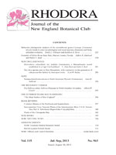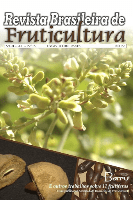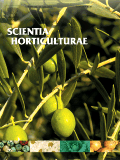
Journal of Berry Research
Scope & Guideline
Unraveling the Secrets of Berry Benefits
Introduction
Aims and Scopes
- Biodiversity and Genetic Research:
Investigates the genetic diversity and molecular markers of various berry species to enhance breeding programs and improve fruit quality. - Biochemical and Nutritional Analysis:
Explores the biochemical composition of berries, including their polyphenols, vitamins, and antioxidant properties, and their implications for human health. - Cultivation Techniques and Crop Management:
Focuses on innovative agricultural practices, including irrigation, fertilization, and pest management, to optimize berry yield and quality. - Health Benefits and Functional Foods:
Examines the health-promoting properties of berries, including their potential anti-cancer, anti-inflammatory, and antioxidant effects. - Postharvest Physiology and Processing:
Studies the postharvest handling of berries, including storage, processing techniques, and their impact on fruit quality and shelf life. - Environmental and Ecological Impact:
Investigates the effects of climate change and environmental factors on berry cultivation and the ecological niches of berry species.
Trending and Emerging
- Climate Resilience and Adaptation:
Research exploring the impact of climate change on berry species and the development of resilient cultivation practices is increasingly prominent. - Functional Foods and Nutraceuticals:
There is a rising interest in the health benefits of berries, particularly their role as functional foods that can prevent disease and promote wellness. - Metabolomics and Phytochemical Profiling:
Advancements in metabolomic technologies are leading to in-depth studies of berry phytochemicals and their biological activities, contributing to a better understanding of their health benefits. - Innovative Agricultural Practices:
The adoption of novel farming techniques, such as vertical farming and precision agriculture, is becoming a major focus to enhance berry production efficiency. - Bioactivity and Health Research:
An increasing number of studies are focusing on the bioactive compounds in berries and their interactions with human health, particularly in relation to chronic diseases.
Declining or Waning
- Traditional Cultivation Practices:
Research on conventional farming methods for berry production is decreasing as interest shifts towards sustainable and innovative agricultural practices. - Basic Taxonomy and Morphological Studies:
Studies focusing solely on the taxonomy and morphological characteristics of berry species are becoming less frequent, as molecular and genetic approaches gain prominence. - Single-species Focus:
The emphasis on research targeting individual berry species is declining, with a growing trend towards comparative studies that include multiple berry types.
Similar Journals

Ornamental Horticulture-Revista Brasileira de Horticultura Ornamental
Advancing Research for a Greener TomorrowOrnamental Horticulture - Revista Brasileira de Horticultura Ornamental, published by the SOC BRASILEIRA FLORICULTURA & PLANTAS ORNAMENTAIS, serves as a premier platform for disseminating high-quality research in the field of ornamental horticulture. With an Open Access model in place since 1995, this journal ensures that valuable findings in horticultural science reach a wide audience, fostering greater collaboration within the global community. Based in Brazil, this journal primarily focuses on the cultivation, management, and improvement of ornamental plants, contributing significantly to both the scientific and practical aspects of the horticulture industry. It has achieved esteemed rankings, including being classified in the Q2 quartile for Horticulture and Q3 for Plant Science in 2023, demonstrating its academic rigor and relevance. Scopus ranks it at 54th in Horticulture and 278th in Plant Science, positioning it among leading scholarly resources in these fields. The journal is committed to advancing knowledge through innovative research that aids in the sustainable development of ornamental horticulture practices.

HORTICULTURAL SCIENCE
Pioneering Sustainable Practices in Horticultural Science.HORTICULTURAL SCIENCE is a premier scholarly journal published by the Czech Academy Agricultural Sciences, focusing on the myriad facets of horticulture, including plant breeding, cultivation techniques, and sustainable practices. With a robust Open Access model established since 2002, it aims to disseminate high-quality research to a global audience, fostering collaboration and innovation within the field. Located in the heart of Prague, Czech Republic, the journal boasts an impressive Q2 ranking in Horticulture as reported in 2023, placing it within the top tier of its discipline. Furthermore, it ranks 52nd out of 115 in the scope of Agricultural and Biological Sciences, reflecting its growing influence and reach in horticultural research. The journal is an essential resource for researchers, professionals, and students alike, aiming to advance knowledge and practices in horticulture through original research articles, reviews, and case studies. With its commitment to academic rigor and relevance, HORTICULTURAL SCIENCE stands as a vital contribution to the ongoing discourse in horticultural studies.

RHODORA
Nurturing Insights in Botanical StudiesRHODORA, published by the New England Botanical Club Inc, is a prominent journal dedicated to the field of botany, specifically focusing on Horticulture and Plant Science. With a rich history dating back to its founding years and ongoing publication from 1995 to 2024, this journal serves as a vital platform for disseminating research, reviews, and advancements in botanical studies. Though classified in the Q4 quartile for both horticulture and plant science in 2023, RHODORA remains an essential resource for researchers and practitioners, providing insights into plant ecology, conservation, and cultivation practices. While it does not offer Open Access options, the journal's commitment to quality research in a highly specialized field makes it a significant contributor to the botanical sciences, fostering collaboration and innovation among scholars and professionals in the United States and beyond.

Revista Brasileira de Fruticultura
Showcasing Excellence in Brazilian Horticultural ScienceRevista Brasileira de Fruticultura, published by the Sociedade Brasileira de Fruticultura, is a leading scholarly journal dedicated to the advancement of research in the fields of agronomy, crop science, food science, horticulture, and plant science. With an impressive Open Access model adopted since 2001, the journal is committed to disseminating high-quality research from Brazil and beyond, promoting innovation and collaboration among researchers, professionals, and students alike. The journal currently holds a respectable Q3 category ranking in multiple fields as of 2023, reflecting its significance within the scientific community, specifically ranked #72 in horticulture and #257 in agronomy, among its peers. The Revista Brasileira de Fruticultura not only serves as a platform for original research articles, reviews, and case studies but also emphasizes practical applications and sustainable practices in fruit cultivation. Its aim is to enhance the visibility of Brazilian fruit research on a global scale, making it an invaluable resource for those invested in advancing horticultural sciences.

AMERICAN JOURNAL OF POTATO RESEARCH
Connecting Scholars to Drive Potato Research ForwardAMERICAN JOURNAL OF POTATO RESEARCH is a prominent scholarly journal dedicated to the field of potato research, encompassing vital areas of Agronomy and Crop Science. Published by SPRINGER, this journal holds an impactful presence in the scientific community, as evidenced by its placement in the Q2 quartile of both Agronomy and Plant Science categories for 2023. With a Scopus rank of #145 out of 406 in Agricultural and Biological Sciences, it offers a significant platform for researchers, professionals, and students alike. Covering diverse topics from cultivation techniques to pest management, the journal aims to advance understanding and innovation in potato science, facilitating the sharing of cutting-edge research and fostering collaboration among scholars. Accessible to a global audience, the journal encourages the dissemination of knowledge through its open-access options. Since its inception in 1998, the AMERICAN JOURNAL OF POTATO RESEARCH has been committed to contributing valuable insights that drive the industry forward and support sustainable agricultural practices.

MITTEILUNGEN KLOSTERNEUBURG
Shaping the Future of Horticulture Through ResearchMITTEILUNGEN KLOSTERNEUBURG is a prestigious journal published by the Höhere Bundeslehranstalt & Bundesamt für Wein- und Obstbau Klosterneuburg in Austria, focusing on the fields of horticulture and agricultural sciences. With an ISSN of 0007-5922, this journal disseminates vital research findings and advancements within the horticultural sector, emphasizing sustainable practices and innovative techniques in wine and fruit cultivation. It has been recognized for its scholarly contributions, achieving a Q3 ranking in horticulture as of 2023, positioning it among the notable resources in its field. While currently not offering open access options, MITTEILUNGEN KLOSTERNEUBURG remains an essential platform for researchers, professionals, and students alike, fostering knowledge exchange and collaborative advancements in horticultural science. The journal's dedication to supporting research from 1989 through 2024 highlights its longstanding commitment to excellence in the industry.

JOURNAL OF THE PROFESSIONAL ASSOCIATION FOR CACTUS DEVELOPMENT
Promoting Excellence in Horticultural ScienceJOURNAL OF THE PROFESSIONAL ASSOCIATION FOR CACTUS DEVELOPMENT is an esteemed publication within the fields of Horticulture and Plant Science, managed by the Professional Association for Cactus Development. With its ISSN 1938-663X and E-ISSN 1938-6648, this journal stands as a vital platform for disseminating research and innovative practices concerning the growth, cultivation, and conservation of cacti. Despite being categorized in the Q4 quartile for both Horticulture and Plant Science in 2023, it provides invaluable insights and breakthroughs that are crucial for advancing knowledge and practices in this specialized area of study. The journal, which has been published consistently from 2003 to 2011 and from 2013 to 2024, encourages contributions from researchers, professionals, and students alike, fostering a community dedicated to the sustainable development of cactus species. Although currently not indexed with an impact factor or H-index, its targeted readership can access essential information to enhance both academic and practical applications within the horticultural sciences. For submission guidelines and further details, authors and readers are encouraged to visit the journal's official site.

Acta Scientiarum Polonorum-Hortorum Cultus
Advancing Horticultural Innovation and Research.Acta Scientiarum Polonorum-Hortorum Cultus is a notable open-access journal dedicated to the field of horticultural science, published by UNIV LIFE SCIENCES LUBLIN in Poland. Since its inception in 2002, it has aimed to disseminate high-quality research findings, innovative methodologies, and advancements in the horticultural sector. The journal is indexed in Scopus and has ranked in the 33rd percentile for Horticulture and the 25th percentile for Plant Science, indicating its growing influence and relevance within the scientific community. Despite the challenges presented in quartile categorizations, Acta Scientiarum Polonorum maintains a commitment to cultivating knowledge and fostering collaboration among researchers, professionals, and students in the agricultural and biological sciences. With its publication timelines spanning from 2008 to 2024, the journal serves as a vital resource for those interested in the latest horticultural trends, sustainable practices, and scientific inquiries that drive the field forward.

SCIENTIA HORTICULTURAE
Advancing horticultural science for a sustainable future.SCIENTIA HORTICULTURAE, published by Elsevier, is a leading journal in the field of horticulture, with an impressive impact factor reflected in its Q1 ranking (2023) and position as #6 out of 115 in the Scopus category for Agricultural and Biological Sciences. This journal plays a pivotal role in disseminating cutting-edge research and innovations in horticultural science and technology, contributing significantly to the understanding of plant cultivation, production, and management. With continuous publication since 1973, SCIENTIA HORTICULTURAE offers an essential platform for researchers, professionals, and students alike who are focused on the advancement of sustainable horticultural practices. Although it is not an open-access journal, it provides a wealth of data and findings that can be accessed through institutions and libraries. Located in the Netherlands at RADARWEG 29, 1043 NX AMSTERDAM, this journal remains an invaluable asset to the global horticultural community throughout its converged years, fostering collaboration and elevating standards in horticulture research.

JOURNAL OF HORTICULTURAL SCIENCE & BIOTECHNOLOGY
Pioneering sustainable practices in horticulture and biotechnology.JOURNAL OF HORTICULTURAL SCIENCE & BIOTECHNOLOGY, published by Taylor & Francis Ltd, stands as a prestigious platform in the realms of both horticulture and biotechnology. With an ISSN of 1462-0316 and an E-ISSN of 2380-4084, this journal showcases cutting-edge research that advances our understanding of plant science and genetic innovation. Operating under the publication umbrella from 1996 to 2024, the journal has achieved notable rankings, placing in the Q3 quartile for Genetics and Q2 for Horticulture in 2023. With a Scopus ranking of #25/115 in Agricultural and Biological Sciences (Horticulture) and a respectable 78th percentile, it is highly regarded among researchers and professionals alike. While currently not designated as Open Access, the journal remains crucial for academics keen on disseminating groundbreaking findings and techniques that foster advancements in agricultural productivity and sustainability. As an essential resource for researchers, professionals, and students, JOURNAL OF HORTICULTURAL SCIENCE & BIOTECHNOLOGY not only facilitates knowledge sharing within its community but also serves as a vital reference point for future innovations in the field.